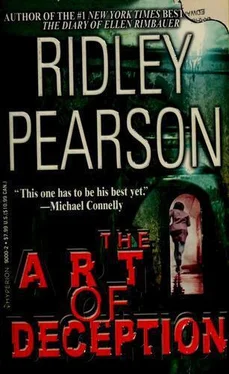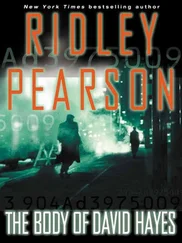Ridley Pearson - The Art of Deception
Здесь есть возможность читать онлайн «Ridley Pearson - The Art of Deception» весь текст электронной книги совершенно бесплатно (целиком полную версию без сокращений). В некоторых случаях можно слушать аудио, скачать через торрент в формате fb2 и присутствует краткое содержание. Жанр: Триллер, на английском языке. Описание произведения, (предисловие) а так же отзывы посетителей доступны на портале библиотеки ЛибКат.
- Название:The Art of Deception
- Автор:
- Жанр:
- Год:неизвестен
- ISBN:нет данных
- Рейтинг книги:3 / 5. Голосов: 1
-
Избранное:Добавить в избранное
- Отзывы:
-
Ваша оценка:
- 60
- 1
- 2
- 3
- 4
- 5
The Art of Deception: краткое содержание, описание и аннотация
Предлагаем к чтению аннотацию, описание, краткое содержание или предисловие (зависит от того, что написал сам автор книги «The Art of Deception»). Если вы не нашли необходимую информацию о книге — напишите в комментариях, мы постараемся отыскать её.
The Art of Deception — читать онлайн бесплатно полную книгу (весь текст) целиком
Ниже представлен текст книги, разбитый по страницам. Система сохранения места последней прочитанной страницы, позволяет с удобством читать онлайн бесплатно книгу «The Art of Deception», без необходимости каждый раз заново искать на чём Вы остановились. Поставьте закладку, и сможете в любой момент перейти на страницу, на которой закончили чтение.
Интервал:
Закладка:
“Let’s get down to brass tacks,” she heard LaMoia say, his voice made nasal by the small speaker.
She thought it impossible, but Walker looked another ten years older all of a sudden, probably the result of the tube lighting-inkwells beneath both eyes, a pasty bluish tone to facial skin stretched by a self-imposed starvation. He hardly moved in the chair, and when he spoke it was with a controlled calm that troubled her, leaving her wondering what they’d gotten themselves into. Who was running whom?
“My father used to say that,” Walker said. He directed himself to the pane of glass that inside the Box was a large mirror.
“Is she listening? Are you there, Daphne?”
“Hey!” LaMoia fired off, trying to win Walker’s attention but failing.
“I’m so disappointed in you,” Walker said.
She felt her stomach turn. He seemed to know exactly where she was standing. She moved to her left, his eyes seemed to follow. It was an uncanny display of empathetic behavior.
“Tell me about the skeleton key,” LaMoia said.
Walker continued to stare at the mirror-at her.
“Hey!” LaMoia reprimanded for a second time, “I’m talking to you.” He stood and came around the table.
Walker’s head jerked up to intercept the man. “You lay a finger on me, and this is in the hands of the lawyers.”
It stopped LaMoia like he’d hit an invisible shield. “You’ve been watching too much Court TV.”
“Uh-huh,” Walker said, fixated on the mirror again, “in all my free time at the country club.”
“A comedian?” LaMoia asked.
“That’s me,” Walker answered. He spoke more loudly, “Tell him, Daphne.”
“Her part of the deal was putting Neal into that lineup. Your part was the key … but a key needs a door.”
“I don’t know anything about any key,” Walker said-deliberately unconvincingly? — bending to look past LaMoia, who attempted to block the man’s view of the mirror, “but I’m sure you’ll figure it out.” He looked up into LaMoia’s eyes. “You don’t need my help with everything, do you?”
“I don’t need your help with anything,” LaMoia snapped.
“You’ve got that turned around, friend.”
“The deal was to put Neal away. He gets put away, maybe you find that door.”
“It could work the other way,” LaMoia proposed.
“Could it, you think?” Walker asked.
“It’s a two-way street.”
“Is it?” Walker let the animal loose then. He bared his teeth, his eyes rolling white into the back of his head, his neck a fan of tight wires from jaw to collarbone. “We … had … a … deal!” he screamed, actually driving LaMoia back a step.
His raw voice distorted the observation booth’s small speaker.
Spittle dripped down his chin. He wiped it off on his shirt-sleeve. He had never taken his eyes off Matthews, reconnected now by LaMoia’s movement.
LaMoia said, “We get this thing right without you, and you’re buried.”
“Nice choice of words, Detective. Tell him, Daphne.”
“You’re a fucking freak show,” LaMoia said, approaching Walker once again. He leaned in closely and said, “You leave her out of this, Walker. It’s me you’ve got to worry about.”
Keeping his eyes directly on her, not on LaMoia, Walker said, “She wants out of this, she’s out of this. Simple as pie.
Mary-Ann wanted out, and look what happened to her.” He found LaMoia again, back on track, a sail filling with wind.
“Look what Neal did to her.”
LaMoia said, “The church has doors that take skeleton keys.
The church at the Shelter. We’re checking that entire section of Underground as we speak.” He repeated, “We solve it without you-”
Walker interrupted, “And I’m buried. Yeah, I got that the first time.” He threw open his arms. “Bury me, Detective. At least charge me. Do something other than just harassing me, would you please? Ask her what she wants. Ask her what comes next. She knows, Detective. Do you? I don’t think you have a clue.” He stood out of his chair and pointed, “But she does! Is it over, Daphne? Is it?” To LaMoia: “She’s living with you now.
You ask her.”
LaMoia shoved the man down hard, returning him to his chair. He leaned into the man’s ear and whispered softly enough to avoid the recorder. “You ever set foot in my place again, Einstein, and I’ll rip you a new asshole and make you eat your own shit.”
He stepped back. Walker blanched, his lips wet with saliva, his eyes watery and hard. “We’ll see,” he said.
“Yes, we will,” LaMoia said.
“You ask her,” Walker said. “She knows what comes next.”
Magoo
“Here’s what we’ve got so far,” said Dr. Bernie Lofgrin, a squat, balding man with eyes so magnified by his goggle-sized glasses that they looked more like hard-boiled eggs cut in half when he got excited. He was a favorite among the SPD detectives, his nickname an appropriate Magoo.
As the civilian director of SID, Lofgrin had worked cases with Boldt for more than a decade, his forensics lab supplying the technical pieces of the puzzle so necessary to an investigation and the subsequent prosecution. An arrest might come from information supplied by a snitch or a witness, but convictions came from evidence supplied by the lab. Where some detectives worked their contacts, their informants, their resources, Boldt chose to rebuild the life of the victim just before death, and to rely upon the physical evidence to tell the real story of what had happened. Every investigator did this to some degree, but Boldt had made his own science of it, and as such, had formed both a partnership and a deep friendship with Lofgrin.
Both jazz aficionados, the currency of their exchanged favors was rare recordings or treasured masterpieces. Building one’s collection was as important as growing one’s IRA. Boldt’s collection of more than ten thousand LPs dwarfed that of Lofgrin or Doc Dixon, and as he was typically the one in need of favors at the office, his cassette recorder was the one that was more active.
Lofgrin loved to hear himself talk. He was meant more for the university than the laboratory. “We patched together a full set of latents from the one hundred and thirty-seven lifts we developed down there. You can be fairly confident that a high percentage of those are all from the same individual. More to come.
“There was no apparent effort to keep the place wiped down,” he continued. “Your resident wasn’t thinking he’d have visitors. And yes, we’re running the latents through the state database and we’re passing them on to the nationals as well.”
He recited, “If this guy’s ever been printed, we’re going to know about it.” His stained smile revealed he’d taken up smoking again. The smoking concerned Boldt: Lofgrin’s heart suffered inside a nervous, agitated body.
SID had failed to locate the suspect’s escape route out of the Underground, leaving more questions than answers.
“Did we check the prints against-”
“Ferrell Walker?” Lofgrin interrupted. “I read my e-mails, Lou. The answer is yes, Matthews got Walker to roll some prints for us. If he was ever in that lair we’re never going to prove it.
The prints aren’t his.”
Lofgrin gained energy when Boldt took notes, so sometimes Boldt scribbled things into his notebook just to appear active, as was the case now.
Boldt said, “At this point it wouldn’t surprise me if this guy Walker goes down for several of our open cases. The more we look at him, the more it looks that way-to me, to LaMoia, even Daffy.” When an investigator pushed the lab in one direction, it tended to prejudice and speed up results, but Boldt-who rarely used such ploys-couldn’t be sure if Lofgrin had even heard him.
Читать дальшеИнтервал:
Закладка:
Похожие книги на «The Art of Deception»
Представляем Вашему вниманию похожие книги на «The Art of Deception» списком для выбора. Мы отобрали схожую по названию и смыслу литературу в надежде предоставить читателям больше вариантов отыскать новые, интересные, ещё непрочитанные произведения.
Обсуждение, отзывы о книге «The Art of Deception» и просто собственные мнения читателей. Оставьте ваши комментарии, напишите, что Вы думаете о произведении, его смысле или главных героях. Укажите что конкретно понравилось, а что нет, и почему Вы так считаете.












